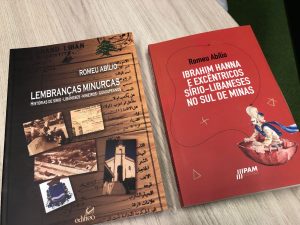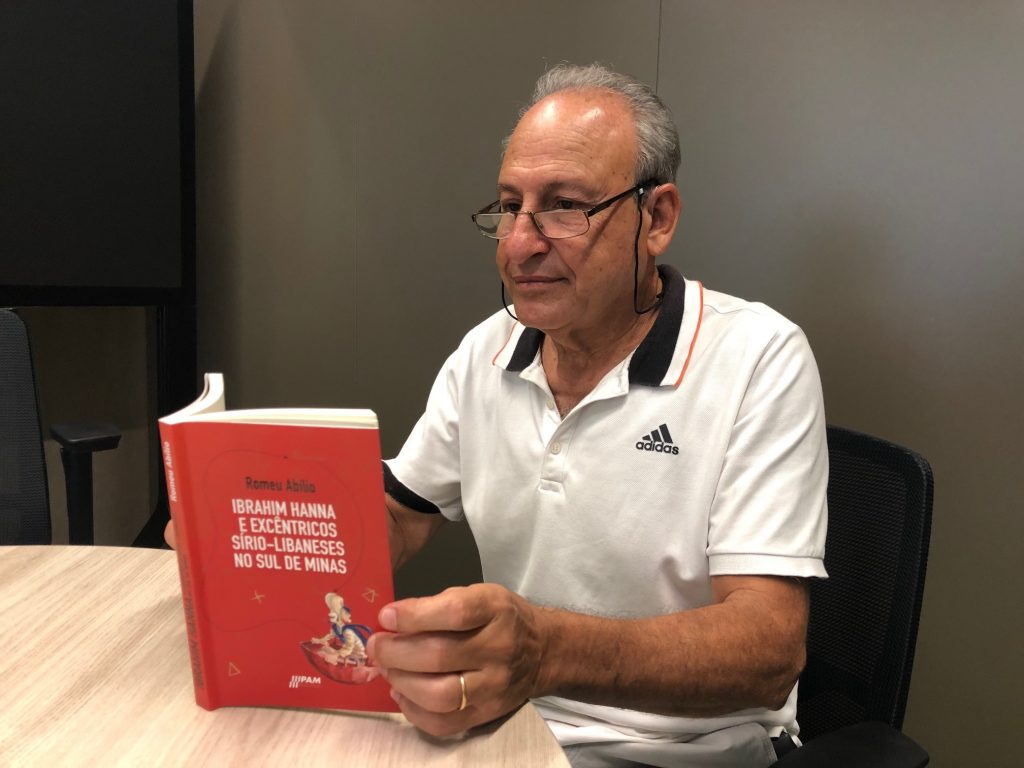São Paulo – “A man dies twice, when his vital functions stop working and when nobody says his name anymore.” This is one of the first passages in the book “Ibrahim Hanna e Excêntricos Sírio-Libaneses no Sul de Minas” [Ibrahim Hanna and Some Eccentric Syrian-Lebanese in Southern Minas]. As the author Romeu Abílio says, “that is the intention of the book, not letting our culture die,” stressing the need he felt to tell the story of his ancestors and the Syrian-Lebanese immigration in the city of Guaxupé, 260 miles from Belo Horizonte and 100 miles from Ribeirão Preto.
The historical fiction is the second book by the Lebanese-Brazilian retired judge, to be released on the next few months. Different from his first book “Lembranças Minurcas,” (Minurca Memories), a documental non-fiction about Arab immigration in Southern Minas Gerais, this work brings a fictious character permeating the historical passages, Ibrahim Hanna, who the author describes as “an alchemist, astronomer and cook who flies with a copper cauldron by his mental power only.”
Aiming to recover Syrian-Lebanese culture in Minas Gerais, the book brings a series of stories and anecdotes about immigrants by the end of the 19th and the beginning of 20th century. According to Abílio, the book talks about these people’s families, trade, religion, and daily life.
“My father family came from Tell Aabbas, or Mount Aabbas, in Lebanon, in 1924, and my mother’s from Baino Akkar, in 1900. There are more then 400 Syrian-Lebanese families in [Guaxupé], the majority being Orthodox Christian, coming from North Lebanon. Almost no Muslims came during World War I,” he told, explaining the region also received many Italian immigrants during that time. Guaxupé houses a church considered by some historians as the first Orthodox church in Brazil and according to him, this faith, is present in his book.
The book starts with a passage by the time-traveler character Ibrahim Hanna in 1500, during the discover of Brazil, when references to the Phoenicia and Arab navigators from the 9th century, and then he arrives at Guaxupé at the end of the 19th century.
Between the stories, Abílio highlighted the anecdote “Três Dedos” [Three Digits], referring to the three digits (thumb, index and middle finger) the Orthodox Christian use with their right hand to make the sign of the cross. The story talks about a Syrian who loses his right thumb and creates an entirely new religion because of the accident.
Another story by Abílio is “Vixe Maria!” [Holy Mary], about a Syrian old lady who confesses to a priest. When he listens to her “captious sins”, he says the title words loud and clear, stirring curiosity among the people in the church.

Abílio also tells a little about the history of the Chancliche, a cheese typical from North Lebanon that started being produced by hand in the region in the beginning of the 20th century and now is industrially produced and sold all over Brazil. “My grandmother made the chancliche balls and walked 7 miles to a nearby city to sell them; when she arrived home, she handed the money to my father, who usually spent all of it gambling,” revealed the author. According to him, many Lebanese men from those times were addicted to card games. “I’ve heard stories from many men who made fortunes and lost everything gambling,” he told.
The book also tells about the involvement of Syrian-Lebanese in the Regional Cooperative of Coffee Growers in Guaxupé. Cooxupé has 14,000 cooperates and is considered the largest coffee cooperative in the whole world, besides being one of the largest coffee producers in Brazil, being responsible for approximately 10% of Brazilian total production last year.
Romeu Abílio is graduated in history and law by University of São Paulo (USP), was baptized as an Orthodox Christian and lived in a Catholic seminary for seven years. “I have been privileged, things were a little easier for me because of my seminary, then I came to São Paulo to study, and then became a judge,” said Abílio.
“Truth is most Arabs who came to Brazil were illiterate and came from a poor background after World War I, and couldn’t make their dreams of becoming rich come true, they just survived, with rare exceptions,” he declared, busting the myth that every Syrian-Lebanese is rich.
Abilio’s first book, “Lembranças Minurcas”, were published in 2015.
His new book, published by Instituto Paulista de Magistrados (IPAM), will be launched at Centro Universitário da Fundação Educacional Guaxupé (UNIFEG) in Minas Gerais in 29 March, and then in São Paulo at Esporte Clube Sírio in April 13.
Fact Sheet
“Ibrahim Hanna e Excêntricos Sírio-Libaneses no Sul de Minas”
Romeu Abílio, 2018
334 pages
Instituto Paulista de Magistrados (IPAM)
ISBN 978-85-69031-16-1




